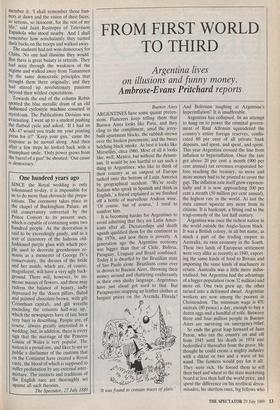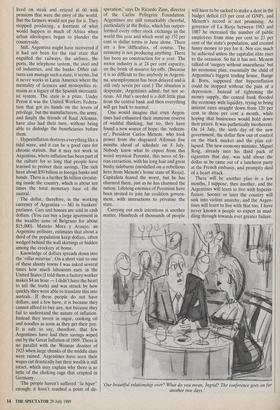FROM FIRST WORLD TO THIRD
Argentina lives on illusions and funny money.
Ambrose-Evans Pritchard reports Buenos Aires ARGENTINES have some quaint preten- sions. Flatterers keep telling them that Buenos Aires looks like Paris, and they cling to the compliment, amid the jerry- built apartment blocks, the rubbish strewn over the broken pavements, and the buses belching black smoke. At best it looks like Marseilles, circa 1960. Most of all it looks like, well, Mexico, but without the dynam- ism. It would be too hurtful to say such a thing to Argentines, who like to think of their country as an outpost of Europe tacked onto the bottom of Latin America by geographical accident. 'We're really Italians who speak in Spanish and think in English,' a friend explained as we finished off a bottle of marvellous Andean wine. 'Of course, but of course,' I tried to comfort him. It is becoming harder for Argentines to avoid admitting that they are Latin Amer- icans after all. Dictatorships and death squads qualified them for the continent in the 1970s, and now there is poverty. A generation ago the Argentine economy was bigger than that of Chile, Bolivia, Paraguay, Uruguay and Brazil combined. Today it is dwarfed by the Brazilian state of Sao Paolo alone. Brazilians come over in droves to Buenos Aires, throwing their money around and chattering exuberantly in their own slushy language. Argentines have just about got used to that. But Paraguayans snapping up leather clothes at bargain prices on the Avenida Florida?
'It was found to contain traces of glass.' And Bolivians laughing at Argentina's hyperinflation? It is insufferable.
Argentina has collapsed. In an attempt to hang on to power the criminal govern- ment of Raul Alfonsin squandered the country's entire foreign reserves, confis- cated 80 per cent of all private bank deposits, and spent, and spent, and spent. This year Argentina crossed the line from inflation to hyperinflation. Once the rate got above 20 per cent a month (900 per cent annual) tax revenues evaporated be- fore reaching the treasury, so more and more money had to be printed to cover the gap. The inflation rate itself grew exponen- tially and it is now approaching 200 per cent a month (50 million per cent annual), the highest rate in the world. At last the state cannot squeeze any more from its citizens. It is bankrupt, a fitting end to the tragi-comedy of the last half century.
Argentina was once the richest nation in the world outside the Anglo-Saxon block. It was a British colony, in all but name, as much a part of the trading empire as Australia, its twin economy in the South. These two lands of European settlement were very alike as recently as 1940, export- ing the same kinds of food to Britain and importing the same kinds of machinery in return. Australia was a little more indus- trialised, but Argentina had the advantage of a bigger population (now 32 million) and more oil. One twin grew up, the other turned into a deformed dwarf. Argentine workers are now among the poorest in Christendom. The minimum wage is 870 australs (80 pence) a day, enough to bny a dozen eggs and a handful of rolls. Between three and four million people in Buenos Aires are surviving on emergency relief.
So ends the great leap forward of Juan Peron, who ran the country on and off from 1945 until his death in 1974 and bedevilled it thereafter from the grave. He thought he could create a mighty industry with a diktat or two and a wave of his wand. The farmers would pay for it all. They were rich. He forced them to sell their beef and wheat to the state marketing board at less than half the world price, and spent the difference on his mythical desca- misados, his shirtless ones, big fellows who lived on steak and retired at 60 with pensions that were the envy of the world. But the farmers would not pay for it. They stopped producing, a foretaste of what would happen in much of Africa when urban ideologues began to plunder the countryside.
Still, Argentina might have recovered if it had not been for the vast state that engulfed the railways, the airlines, the ports, the telephone system, the steel and oil industries, and the banks. Other cul- tures can manage such a state, it seems, but it never works in Latin America where the mentality of licences and monopolies re- mains as a legacy of the Spanish mercantil- ist system. The state is a prize. Under Peron it was the United Workers Federa- tion that got its hands on the levers of privilege, but the manufacturers, the army, and finally the friends of Raul Alfonsin, have also had their turn, without being able to dislodge the beneficiaries before them.
Hyperinflation destroys everything like a tidal wave, and it can be a good cure for chronic statism. But it may not work in Argentina, where inflation has been part of the culture for so long that people have learned to protect their savings. The rich have about $50 billion in foreign banks and bonds. There is a further $6 billion circulat- ing inside the country, which is about ten times the total monetary base of the austral.
The dollar, therefore, is the working currency of Argentina — M1 in bankers' parlance. Cars and houses are sold in cash dollars. (You can buy a large apartment in the wealthy zone of Belgrano for about $15,000). Manolo Mora y Araujo, an Argentine pollister, estimates that about a third of the population keep dollars, often wedged behind the wall skirtings or hidden among the crockery at home.
Knowledge of dollars spreads down into the 'villas miserias'. On a short visit to one of these shanty towns I was asked several times how much labourers earn in the United States (I told them a factory worker makes $4 an hour — I didn't have the heart to tell the truth) and was struck by how quickly they were able to translate this into australs. If these people do not have dollars, and a few have, it is because they cannot afford to buy any, not because they fail to understand the nature of inflation. Instead they invest in sugar, cooking oil and noodles as soon as they get their pay. It is safe to say, therefore, that few Argentines have had their savings wiped out by the Great Inflation of 1989. There is no parallel with the Weimar disaster of 1923 when large chunks of the middle class were ruined. Argentines have seen their wages cut drastically but their wealth is still intact, which may explain why there is so little of the choking rage that erupted in Germany.
'The people haven't suffered "la hiper" enough; it hasn't reached a point of de- speration,' says Dr Ricardo Zinn, director of the Carlos Pellegrini Foundation. Argentines are still remarkably cheerful, particularly at the Bolsa, which has outper- formed every other stock exchange in the world this year and which went up 152 per cent in dollar terms in June alone. There are a few difficulties, of course. The economy is not producing anything. There has been no construction for a year. The motor industry is at 24 per cent capacity, on the brink of massive lay-offs. (Because it is so difficult to fire anybody in Argenti- na, unemployment has been delayed and is still only seven per cent.) The situation is desperate, Argentines admit, but not se- rious. All that's needed is a deft little plan from the central bank and then everything will get back to normal.
One would imagine that even Argen- tines had exhausted their immense reserve of wishful thinking, but no, they have found a new source of hope: the 'redeem- er', President Carlos Menem, who took power from the disgraced Alfonsin five months ahead of schedule on 8 July. Nobody knew what to expect from this weird mystical Peronist, this turco of Sy- rian extraction, with his long hair and great bushy sideburns (modelled on a rebellious hero from Menem's home state of Rioja). Capitalists feared the worst, but he has charmed them, just as he has charmed the nation. Lifelong enemies of Peronism have been invited to join his coalition govern- ment, with instructions to privatise the state.
Carrying out such intentions is another matter. Hundreds of thousands of people will have to be sacked to make a dent in the budget deficit (15 per cent of GNP), and Menem's record is not promising. As governor of La Rioja between 1983 and 1987 he increased the number of public employees from nine per cent to 23 per cent of the state's population, and created funny money to pay for it. Nor can much be achieved unless the capitalist elite rises to the occasion. So far it has not. Menem talked of 'surgery without anaesthesia' but his economic plan, essentially the child of Argentina's biggest trading house, Bunge & Born, supposed that hyperinflation could be stopped without the pain of a depression. Instead of tightening the money supply, the central bank flooded the economy with liquidity, trying to bring interest rates straight down from 120 per cent to three per cent a month, while hoping that businesses would hold down their prices. It was pathetically incoherent. On 14 July, the sixth day of the new government, the dollar flew out of control on the black market and the plan col- lapsed. The new economy minister, Miguel , Roig, already into his third pack of cigarettes that day, was told about the dollar as he came out of a luncheon party at the French embassy, and promptly died of a heart attack.
There will be another plan in a few months, I suppose, then another, and the Argentines will learn to live with hyperin- flation. Sooner or later the country will sink into violent anarchy, and the Argen- tines will learn to live with that too. I have never known a people so expert in mud- dling through towards ever greater failure.
'Our beautiful relationship over? What do you Inean, Ingrid? The conference goes on for another two days.'



















































 Previous page
Previous page